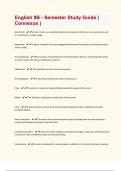Hoofdstuk 1: Nature and process of social research..............................................................................6
1.1 Sociaal onderzoek?.......................................................................................................................6
1.2 Waarom wetenschappelijk onderzoek?........................................................................................7
1.3 Context sociaal onderzoek (beïnvloedende factoren)..................................................................7
1.4 Elementen van het sociaal onderzoeksproces..............................................................................8
1.5 Messiness of social research: de wanorde....................................................................................9
Hoofdstuk 2: Social research strategies in quantitive research and qualitive research..........................9
2.1 Sociaal agogisch onderzoek..........................................................................................................9
2.2 Datacollectie.................................................................................................................................9
2.3 Rol van theorie in relatie tot het onderzoek.................................................................................9
2.4 Types theorieën............................................................................................................................9
2.5 Theorie als inspiratiebron om onderzoek op te zetten...............................................................10
2.6 Zonder theorie geen goed onderzoek?.......................................................................................10
2.7 Onderzoeksbenaderingen...........................................................................................................11
2.8 Benaderingen van onderzoek op basis van kennis – epistemologie...........................................12
2.9 Benaderingen van onderzoek op basis van ontologie – zijnsleer................................................13
2.10 Benaderingen op basis van methodologie................................................................................13
2.11 Beïnvloedende factoren voor onderzoek..................................................................................14
2.12 Benaderingen van onderzoek op basis van praktische haalbaarheid.......................................14
Hoofdstuk 3: Research designs.............................................................................................................15
3.1 Enkele begrippen (kwantitatief onderzoek)................................................................................15
3.2 Enkele begrippen (kwalitatief onderzoek)..................................................................................16
3.3 Variabele.....................................................................................................................................16
3.4 Onderzoeksdesign......................................................................................................................16
3.4.1 Experimenteel design..........................................................................................................17
3.4.2 Longitudinale experimenten................................................................................................21
3.4.3 Cross-sectioneel onderzoek.................................................................................................22
3.4.4 Trendonderzoek (optioneel)................................................................................................24
3.4.5 Case study design................................................................................................................24
3.4.6 Comparative design.............................................................................................................24
Hoofdstuk 4: Planning a research project.............................................................................................25
4.1 In welk thema wil ik onderzoek doen.........................................................................................25
4.2 Twee belangrijke aspecten m.b.t. onderzoek.............................................................................25
4.2.1 Tijd.......................................................................................................................................25
, 4.2.2 Geld.....................................................................................................................................25
4.3 Onderzoeksvraag formuleren.....................................................................................................25
4.4 Thema’s voor onderzoeksvragen................................................................................................25
4.5 Criteria m.b.t. het formuleren van onderzoeksvragen................................................................25
4.6 Hulpmiddelen m.b.t. het formuleren van een onderzoeksvraag................................................26
Hoofdstuk 5: getting started, reviewing the literature.........................................................................26
5.1 Literatuurstudie..........................................................................................................................26
5.2 Type literatuurstudie..................................................................................................................27
5.2.1 Narrative review..................................................................................................................27
5.2.3 Systematic review................................................................................................................28
5.2.4 Meta analyse.......................................................................................................................28
5.2.4 Meta synthese.....................................................................................................................28
Hoofdstuk 6: ethics and politics in social research...............................................................................28
6.1 Geschiedenis – de oorsprong van ethiek in onderzoek..............................................................28
6.2 Onethische experimenten: niet altijd medisch...........................................................................29
6.3 Debat m.b.t. ethiek.....................................................................................................................30
6.4 Houdingen m.b.t. ethiek.............................................................................................................30
6.5 Ethische basisprincipes...............................................................................................................30
6.6 Sociaal ethische aspecten...........................................................................................................31
6.7 Financieel ethische aspecten......................................................................................................31
6.8 Aanpak om geen schade te berokkenen.....................................................................................31
6.9 Anonimiteit en confidentialiteit..................................................................................................31
6.10 Anoniem en vertrouwelijk........................................................................................................31
6.11 Confidentialiteit in kwalitatief onderzoek.................................................................................32
6.12 Bijkomende aspecten naar respondenten toe..........................................................................32
6.13 Informed consent.....................................................................................................................32
6.14 Spanningsvelden.......................................................................................................................32
6.15 Verdoken observatie.................................................................................................................32
6.16 Bedrog – verkeerdelijk informeren...........................................................................................33
6.17 Andere vormen van informed consent.....................................................................................33
6.18 Ethische aandachtspunten – uitbreiding..................................................................................33
6.19 Recht op privacy.......................................................................................................................34
6.20 Ethiek en kwaliteit van het onderzoek......................................................................................34
6.21 Ethiek en nieuwe media...........................................................................................................34
6.22 Politics in onderzoek.................................................................................................................34
6.23 Ethische houding met betrekking tot de wereld van het wetenschappelijk onderzoek...........34
, Hoofdstuk 7: The nature of quantitative research................................................................................35
7.1 Wat is kwantitatief onderzoek?..................................................................................................35
7.2 Doelstellingen kwantitatief onderzoek.......................................................................................35
7.3 Het proces van kwantitatief onderzoek......................................................................................35
7.4 Concepten..................................................................................................................................36
7.5 Operationaliseren.......................................................................................................................36
7.6 Waarom operationaliseren?.......................................................................................................36
7.7 Operationaliseren van concepten...............................................................................................36
7.8 Dimensies binnen concepten......................................................................................................37
7.9 Geoperationaliseerd concept gebruiken/ontwikkelen...............................................................37
7.10 Golden standaardvalidering......................................................................................................38
7.11 Reliability and validity...............................................................................................................38
7.12 Preoccupations of quantitive research.....................................................................................39
7.13 Kritiek op kwantitatief onderzoek.............................................................................................39
7.14 Reversed operationalism bij kwantiatief onderzoek.................................................................39
Hoofdstuk 8: Sampling in quantitive research......................................................................................39
8.1 Steekproef..................................................................................................................................39
8.2 Steekproeven algemeen.............................................................................................................39
8.3 Terminologie...............................................................................................................................40
8.4 Types toevallige steekproeven (aselect).....................................................................................40
8.5 Steekproefgrootte en beïnvloedende factoren..........................................................................41
8.6 Types selecte steekproef............................................................................................................41
8.7 Generaliseerbaarheid.................................................................................................................42
8.8 Error in survey research..............................................................................................................42
Hoofdstuk 9: structured interviewing (kwantitatief onderzoek)..........................................................42
9.1 Structureren...............................................................................................................................42
9.2 Foutreductie...............................................................................................................................43
9.3 Bronnen van fouten....................................................................................................................43
9.4 Accuraatheid en gemak dataprocessing.....................................................................................43
9.5 Gestructureerd interviewen.......................................................................................................44
9.6 Interview via telefoon.................................................................................................................44
9.6 Manieren om een telefonisch interview te doen........................................................................45
9.7 Aandachtspunten bij gestructureerd interview..........................................................................45
9.8 Problemen gestructureerd interview..........................................................................................46
Hoofdstuk 10: Self-administred questionnaires (kwantitatief onderzoek)...........................................46
10.1 Self-administred vs structured interview..................................................................................46


